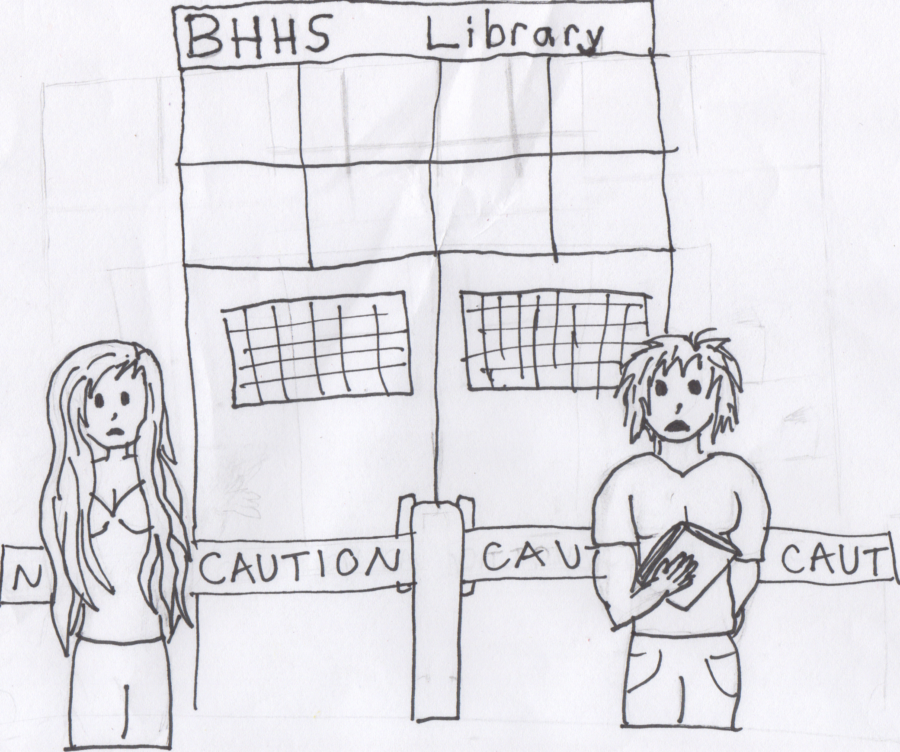As seen in the Dec. 16 print edition
Max Stahl, opinion editor
It’s always the next thing. It’s always sacrifice, reaching for an ever-evasive future that we can shape through hard work today. It’ll be better then, we believe. It has to be. Why else are we all working so hard?
I don’t think I’ve ever had a better reason to quote Ferris Bueller: “Life moves pretty fast. If you don’t stop and look around once in a while, you could miss it.”
As we struggle to provide ourselves with opportunities years down the road, many of us forget that right now, in the prime of our lives, we could be missing the formative experiences that epitomize adolescence. The collegebound have spent the past three years focusing on strengthening and embellishing their applications. Those seeking jobs straight out of high school have spent years developing skills that they’ll need to use in the professional world. Both paths offer rich and fulfilling lives, and they certainly merit the hard work students put into pursuing them. But the students need a break. They need, in essence, a little bout of Senioritis.
And I do mean a little. The Senioritis advocated here is not the Senioritis you hear about from teachers and counselors. It is not an utter abandonment of academic or behavioral integrity, nor is it a descent into utter lethargy. Colleges do reserve the right to revoke lazy and rowdy students’ admission, and employers can rescind job offers just as easily. However, at least in the case of colleges, second-semester seniors are given a decent amount of leeway. According to admissions officers interviewed in the New York Times, students’ grades usually must drop around two letters below average before the college sends them warning letters. As for those who don’t intend to go to college, meeting Beverly’s graduation requirements and good behavior should suffice.
The second semester of 12th grade gives seniors time to explore — socially, academically and culturally. I encourage you to continue to work hard in the classes you’re interested in, but you should also consider devoting more time to non-academic pursuits. Discover new interests, learn new skills, develop what you’re already good at and what you love doing. Second semester is an opportunity to become more cultured, to learn about yourself, to mature and, most of all, to relax. It’s the break you’ve been waiting for.
I’m hesitant to invoke Drake, so instead I’ll turn to the Roman poet Horace, whose “carpe diem” served as the ancient world’s YOLO. A life devoted to work is, in most cases, a life not worth living. For some, work is what makes them happy. But that’s not the case for everybody. We need time to discover what makes us happy and indulge ourselves a little. For those who’ve loaded themselves with coursework and extracurriculars and deprived themselves of sleep for three and a half years, that time may be their last semester of high school. It is important to never lose sight of the future, but we must always remember that before we get to the next thing, we have to make it through now, and if we spend too much time worrying about the next thing, we may never realize that now, in the phosphorescent glow of our nimblest and liveliest years, we missed something truly beautiful.
My mom has been working in the medical field for 25 years, yet she’s never heard of Senioritis.
I’m not surprised, though. In China, where she went to school, seniors take college-placement exams in June, meaning they don’t get a “free” semester. To American high school students, this idea sounds crazy, but maybe the country is on to something here by preventing seniors from blowing off a whole semester. Maybe it’s time that Senioritis in the United States be treated.
Today, there are extraordinary amounts of pressure to go to college. We often forget that the purpose of education is to learn, and so when college apps are done, it’s tempting to shut off our brains. But what good is this, when college professors will expect that you have a firm understanding of a subject? For students using AP credit to skip prerequisite courses, this is especially dangerous. It’s unfair to the professor and other students to waste course time on catching you up — in fact, this won’t happen.
Compared with first semester, the second is inherently less stressful already — no SATs, no college essays, no mindless application details. It may even be excusable to place less emphasis on extracurricular activities you did “for college,” and instead explore some new interests. So with this extra time and more enjoyable schedule, it’s entirely possible to continue being motivated throughout the end of the year. It’s expected not only by your parents and teachers, but also, by your college.
It’s well-known that colleges look at students’ performance at the end of senior year. The National Association for College Admission Counseling wrote in their 2009 report that 21 percent of colleges reported revoking admissions offers, with over 70 percent of the reason being attributed to drop in final grades and disciplinary issues. Both are telltale symptoms of Senioritis, for obvious reasons. Lack of motivation leads to falling academic performance, and more freedom can lead to questionable decisions. Colleges may send you warning letters or ask for an explanation. This undoubtedly muddies a college’s conception of you and could lead to a revocation.
If this college argument does not apply, the reasons against catching Senioritis are still applicable. As already stated, slacking off second semester suggests a diminishing quality of what’s accomplished by the student and sets a bad tone for the future. It shows the attitude that one has, to only put in the minimum amount of work. Senioritis widens the gap between those who try and those who don’t, and by falling behind, catching up is just that more difficult.
Avoiding Senioritis doesn’t mean stressing yourself out, but it does mean keeping track of what matters. There’s still plenty of time to pursue other endeavors, as there will be later on. No one, especially not college-bound students, should look for the easy way out of things. Because, by doing so, one embodies the laziness any university or employer turns away. But I won’t waste any more words here — I’ve heard Senioritis dramatically reduces attention span.






























